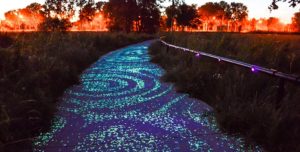
Chris and Melissa Bruntlett found cycling in the Philips company town of Eindhoven, alive and well with a lot of “bicycle bling”: spectacular cycling infrastructural innovations. They wondered whether this is the way to go forward and asked historian and author Frank Veraart. He pointed to the 1960s infrastructural experiment of vertical separation with bicycle tunnels and sunken bicycle roundabout. As Veraart and the Cycling Cities explains, in 1961, the city hired German Engineer Karl Schaechterle to draw up a traffic plan to help solve their congestion problems. His plan, in its most basic form, was to separate “slow” traffic from “fast”. Engineers largely realized this idea through constructing tunnels underneath newly built car-only highways.
The high-tech experiments are continued in the much-celebrated Hovenring and Starry Night Bike Path, homage to Vincent Van Gogh – who lived for a number of years in the nearby village of Nuenen – recalls Eindhoven’s innovative past and future. The kilometer-long trail combines solar-powered, glow-in-the-dark stones with LED lighting, creating a visual spectacle. These spectacular projects reinforce Eindhoven’s branding efforts as the high-tech city, but also question whether they help improve cyclists’ experiences.